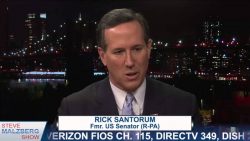Earlier this month, a group of right-wing activists held a simulated Article V convention in Colonial Williamsburg, Virginia, in anticipation that one day enough state legislatures will call for a dangerous Convention of States to propose constitutional amendments to radically alter American government and society by making much of what the federal government currently does unconstitutional.
One of the leading proponents of calling an Article V convention is former Sen. Rick Santorum, whose enthusiasm for a Convention of States appears to be driven by largely by his own historical ignorance about the origins and purpose of the Constitution.
Last week, Santorum appeared on the “Save the Nation” program, which is hosted by fellow Convention of States enthusiast Jason Rapert of the National Association of Christian Lawmakers, to discuss their experience at the simulated convention.
During the discussion, Santorum asserted that anyone who opposes calling for an Article V convention is “undermining the very basic premise of the United States Constitution,” which is ironic given that Santorum’s understanding of the Constitution and the convention that produced it is sorrily lacking.
“Late in the [Constitutional] Convention, they only had one provision of Article V, which was for Congress to be able to amend the Constitution,” Santorum said. “[Virginia delegate] George Mason stood up at the Constitutional Convention and said, ‘Wait a minute, are you saying that the only people who are going to able to put restraints on the federal government is the Congress? Well, we know how that’s going to end and so we have to have a mechanism for the people, through their state legislatures, to limit the power of the federal government.'”
“Elbridge Gerry from Massachusetts and Gouverneur Morris of Pennsylvania drafted this amendment and brought it back to the floor,” Santorum continued. “Every amendment that was offered during the Constitutional Convention to the original Constitution was hotly debated, divisively debated, very close votes; this one was not debated at all and passed unanimously.”
“They were all state legislators,” Santorum asserted by way of explanation. “They wanted the people, through their state legislature—the body closest to them—to be the ones at the top of the food chain. And for people to say, ‘Well, you’re abusing the Constitution,’ the Constitution was set up for the states to be the ones who had the power. If you don’t want the Article V Convention of States, you are undermining the very basic premise of the United States Constitution.”
Santorum’s claim that those who drafted the Constitution wanted the states to “be the ones at the top of the food chain” is precisely backwards, as Right Wing Watch explained before.
On top of that, historians Richard Beeman in his book “Plain, Honest Men: The Making of the American Constitution” and Michael Klarman in his book “The Framers’ Coup: The Making of the United States Constitution,” both debunk Santorum’s claim that a draft version of the Constitution had to be amended to give the states the power to call an Article V convention.
Originally, the draft produced by the Committee of Detail stipulated that the only method by which the Constitution could be amended was for the states to call for such a convention. Alexander Hamilton, a fierce proponent of creating a strong national government, objected, warning that allowing states to control the only means by which amendments could be proposed would inevitably lead them to seek to expand their own power.
James Madison then drafted new language granting Congress the power to propose amendments “whenever two thirds of both houses shall deem it necessary” while retaining the power of the states to call for an Article V Convention and to ratify all proposed amendments.
As for Santorum’s reference to George Mason and Elbridge Gerry, this is particularly telling given that they were two of the most prominent and active members of the Constitutional Convention but ultimately refused to sign the Constitution. Both Mason and Gerry disliked and distrusted the document produced by the Constitutional Convention and wanted it drastically overhauled to weaken the power of the central government. Unfortunately for them, their arguments and criticisms failed to persuade the delegates to the state ratifying conventions, who officially ratified the Constitution in 1788.
If Santorum is going to hold himself up as a defender of the Constitution and accuse his opponents of “undermining the very basic premise” of our founding document, perhaps he should not do by citing the likes of Mason and Gerry, given that they both refused to sign the Constitution and opposed its ratification.
We need your help. Every day, Right Wing Watch exposes extremism to help the public, activists, and journalists understand the strategies and tactics of anti-democratic forces—and respond to an increasingly aggressive and authoritarian far-right movement. The threat is growing, but our resources are not. Any size contribution—or a small monthly donation—will help us continue our work and become more effective at disrupting the ideologies, people, and organizations that threaten our freedom and democracy. Please make an investment in Right Wing Watch’s defense of the values we share.








